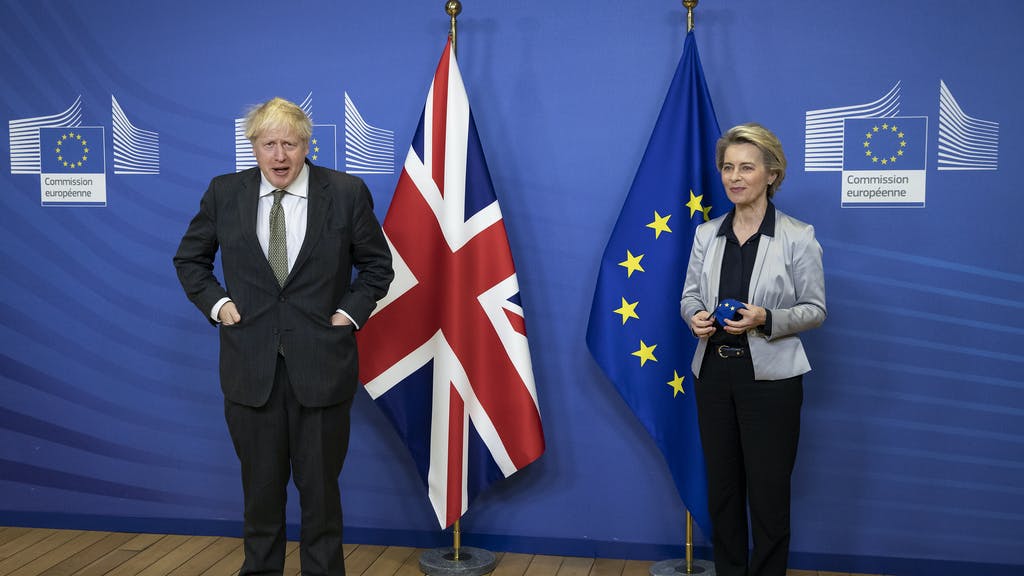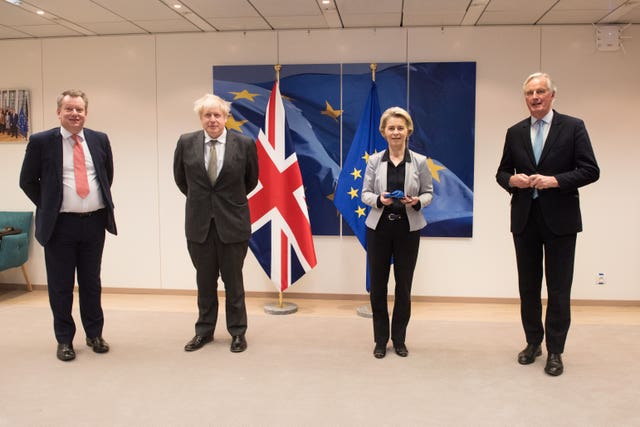Post-Brexit Trade Talks Unlikely To Be Extended Beyond Sunday – Raab

The talks over a post-Brexit trade deal with the European Union are unlikely to be extended beyond Sunday without substantial movement from Brussels, the Foreign Secretary has said.
Boris Johnson and European Commission president Ursula von der Leyen held crunch talks over dinner in Brussels on Wednesday aimed at breaking the deadlock, but Downing Street warned afterwards that “very large gaps” remained.
The pair agreed that a decision on the future of the negotiations will be taken by the end of the weekend.
Dominic Raab told the BBC on Thursday that, while he could not rule out a further extension in the talks process, it is important to have “finality”.
He said: “I think it’s unlikely but I can’t categorically exclude it.”
The Cabinet minister added that there has not been “enough pragmatism and flexibility on the EU side” and called for “substantial movement” from the bloc in order to seal a deal before the weekend is out.
“I don’t think we can keep going on at that pace without having some progress and some flexibility,” he told the BBC.
“Particularly from the UK side, we look at the differences on fairly key points of principle – fairly narrow in scope, we are talking about fisheries, level playing field commitments, the EU’s attempt to lock us in to their rules – we need to see substantial movement.”
UK chief negotiator Lord Frost and his EU counterpart, Michel Barnier, will reconvene in Brussels on Thursday to begin their final push to salvage what has been almost a year of wrangling over a trade deal.
After the leaders’ three-hour dinner, a Number 10 source said it was unclear whether the divide between Brussels and the UK could be bridged.
“The PM does not want to leave any route to a possible deal untested,” said the source, as negotiators were given a fresh mandate to thrash out a deal before transitional trading arrangements end on December 31.
Mrs von der Leyen called the conversation with Mr Johnson “lively and interesting” but stressed their positions remained “far apart”.
The German politician is expected to debrief the leaders of the 27 member countries on the state of play with the negotiations when they gather for a European Council summit on Thursday.
Negotiations have faltered on fishing rights, the level playing field – measures aimed at preventing the UK undercutting the EU on standards and state subsidies – and the way that any deal would be governed.
We had a lively & interesting discussion on the state of play on outstanding issues.
We understand each other’s positions. They remain far apart.
The teams should immediately reconvene to try to resolve these issues. We will come to a decision by the end of the weekend. pic.twitter.com/jG0Mfg35YX
— Ursula von der Leyen (@vonderleyen) December 9, 2020
Mr Raab said the UK has already moved in agreeing to a transition period to allow European trawlermen to adjust to changes in fishing rights, but argued that the EU is asking too much when it comes to level playing field arrangements.
“What we’re not going to be treated is in a way that no other country would accept, and nor would the EU accept,” he told BBC Radio 4’s Today programme.
“It’s about some basic respect for democratic principles.”
Failure to reach agreement would see tariffs imposed on UK exports to the EU, the country’s biggest trading partner, and could also increase bureaucracy.
Stephan Mayer, a state secretary at Germany’s Interior Ministry, told the Today programme that a no-deal outcome would be the “worst solution for both sides”.

The Office for Budget Responsibility has suggested that a no-deal outcome could wipe 2% off gross domestic product, a measure of the size of the economy, in 2021.
Bank of England Governor Andrew Bailey has warned the long-term damage caused by a no-deal situation would be worse than the economic hit from coronavirus, and Tesco chairman John Allan has suggested food bills could rise by as much as 5% as a result of the tariffs and disruption.
Mr Raab sought to play down the impact on food prices if the UK defaults to World Trade Organisation (WTO) rules with the EU, but acknowledged there will be “bumps along the road” if there is no deal.
The pound slid to a two-week low against the dollar on Thursday morning after the talks between Mr Johnson and Mrs von der Leyen failed to produce a decisive breakthrough.
By 9.30am the pound was down 0.8% against the dollar and 0.97% against the euro.
Connor Campbell, a financial analyst at SpreadEx, said: “Sterling took little comfort from the announcement of a new – and, this time, likely permanent – Brexit deadline.”




